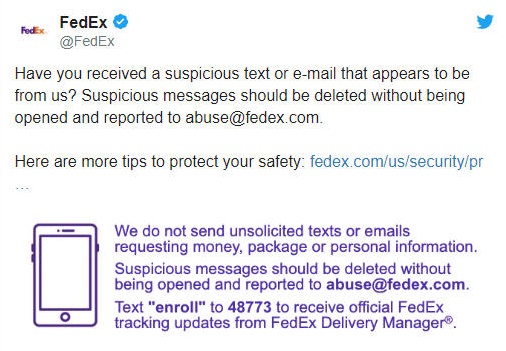There are affiliate links on this page.
Read our disclosure policy to learn more.
FedEx Scam Text
There's no end to the scams that you receive by email, and now scammers are sending scam text messages, too. FedEx is the lastest subject of the
scammers.  In this new scam you get a text with your name
from Fedex (or another delivery service) and a tracking number. There is a link to click on (DON'T) to "set your delivery preferences. Do not click on the link.
Whenevert you have any questions about a tracking number, go to the main website of the shipping company and search the tracking number yourself!
In this new scam you get a text with your name
from Fedex (or another delivery service) and a tracking number. There is a link to click on (DON'T) to "set your delivery preferences. Do not click on the link.
Whenevert you have any questions about a tracking number, go to the main website of the shipping company and search the tracking number yourself!
FedEx sent out a warning via Twitter about the scam. At right (or below) is an example screenshot of the FedEx's warning about the scam..
FedEx's Warning and help
FedEx, on their website here, http://www.fedex.com/ng/about/fraudulent_use.html, says:
Unauthorized use of FedEx® Business Names, Service Marks and Logos
FedEx has been alerted to the unauthorized use of its business names, service marks and logos by persons or companies fraudulently representing themselves as FedEx or as representatives of FedEx.
Millions of fraudulent e-mails and sms messages are deployed daily. They claim to come from a wide variety of sources, and some claim to be from FedEx or representing FedEx. Fraudulent e-mail and sms messages, often referred to as "phishing" or brand "spoofing," are becoming increasingly common. These types of messages often use corporate logos, colors and legal disclaimers to make it appear as though they are real. They are sent in an attempt to trick people into sending money and providing personal information such as usernames, passwords and/or credit card details, and for the purpose of committing theft, identity theft and/or other crimes.
Recognizing Phishing Scam E-mails and sms messages
Recognizing phishing scam e-mails and sms messages is key to protecting yourself against such theft and other crimes. Indicators that an e-mail or sms message might be fraudulent include:
- Unexpected requests for money in return for delivery of a package or other item, personal and/or financial information, such as your Social Security number, bank account number, or other identification.
- Links to misspelled or slightly altered Web-site addresses. For example, variations on the correct Web-site address fedex.com, such as fedx.com or fed-ex.com.
- Alarming messages and requests for immediate action, such as "Your account will be suspended within 24 hours if you don't respond" or claims that you've won the lottery or a prize.
- Spelling and grammatical errors and excessive use of exclamation points (!).
FedEx does not request, via unsolicited mail, e-mail or sms messages, payment or personal information in return for goods in transit or in FedEx custody. If you have received a fraudulent e-mail or sms message that claims to be from FedEx, you can report it by forwarding it to abuse@fedex.com.
If you have any questions or concerns about services provided by FedEx, please review our services at FedEx Services or contact FedEx Customer Service.